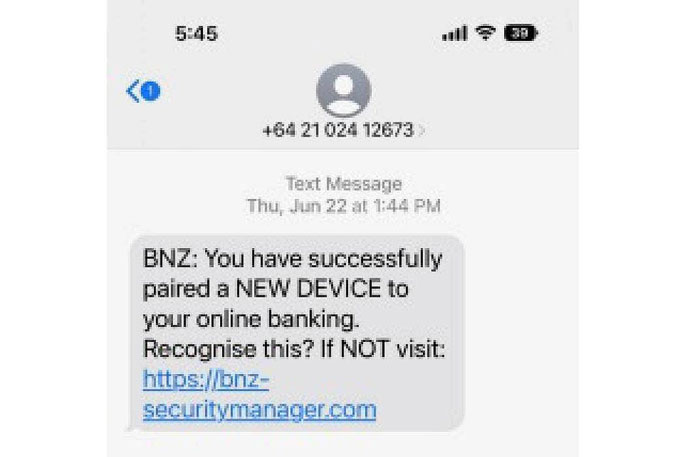A woman who lost $42,000 through a text scam feels let down by her bank who have taken 12 days to notify her she is now unlikely to receive her money back.
Savannah Jackson received a text message from what she thought was a BNZ number on June 22, opened the text link, logged in with her bank password and instantly saw money being transferred from her account.
'I got a text BNZ alert that said ‘just to confirm a new device has been added to your account'.
'I am the only one that uses this account, so I stupidly clicked on the page and as soon as I did it I said ‘oh f...'.”
Jackson called BNZ and while on hold, the BNZ fraud department called her after noticing suspicious activity.
'They saw all the funds in my accounts transferred to Wise and were calling me to check if I had done the transfer.
The money was transferred from her own account to third party company Wise. Third party accounts are a common way scammers take money from those who are scammed.
'I immediately told BNZ that ‘No, I did not authorise the transfer' and that I was frantically trying to call them to stop the transfer.
'The fraud agent told me that they had flagged the transaction as a possible fraud theft, but that the bank had already let the transfer go through.”
Jackson said that was really disappointing, because she felt BNZ should have stopped the action before calling her.
However, BNZ told Stuff that they called Jackson after the funds had been completely transferred over to Wise.
'We understand how distressing it is to lose money to a scam. Scams come in many, often sophisticated, forms but a common scam is unsolicited messages sent by scammers either in texts or emails enticing people to provide personal or financial information such as banking details,” a spokesperson said.
The bank confirmed the scam was initiated when the customer clicked on a link sent via a text message from a scammer impersonating BNZ.
'BNZ will never ask for customers' passwords nor send an email or text message with a link asking customers to click to log in.”
It has now been two weeks since the incident and the bank have told her it is unlikely she will get her money back, as the responsibility is now with Wise.
A Wise spokesperson told Stuff they 'are aware of the situation regarding Savannah's case and are currently investigating”.
'At Wise, we take all scam and fraud cases seriously, and encourage those who have fallen victim to them to report it to CertNZ and the police if necessary,” they said.
Jackson feels let down by BNZ's communication, saying she had been seeking updates every day.
'I can't understand how a major bank like BNZ and their fraud department can't get through to a major international funds transfer company.”
The bank said they have been in regular contact with Jackson and kept her up to date with the status of the investigation. Stuff have seen the emails, which Jackson had initiated and BNZ responded.
'Given the increasingly sophisticated nature of cyber-crime, investigations can be complex and lengthy,” said a BNZ spokesperson.
'When a customer's funds have been transferred to another financial institution or bank, we must rely on them to investigate and recover the funds, which means we can only move as fast as they do.”
 The text message Jackson received on June 22. Supplied image.
The text message Jackson received on June 22. Supplied image.
Jackson manages over 20 properties in Queenstown, six of which she owns. The $42,000 was for wages for her employees, as well as GST.
She has had to delay paying her employees for over a week, which has been stressful.
'This money was my entire business bank account... My business is now under serious financial threat yet the BNZ can't seem to do anything to help me.”
While Jackson is kicking herself for falling for a text scam, she said it wasn't obvious, and she was caught out by a busy day.
'Can't believe I fell for it. I got sucked in and I am kicking myself.”
The bank advised people to be very careful to any texts from numbers claiming they are a bank.
'It is critical that we are all alert to unsolicited texts and emails, never click on links, and never provide our personal or account information. Ultimately if customers do supply information, it can be used by scammers to gain access to their accounts and steal money.”
BNZ have indicated Jackson's case will now be investigated, which can take eight to 12 weeks.
'I am feeling a bit numb. Last week I was losing my mind, I really expected the bank to come back with good news.”
Scams are increasingly sophisticated the bank says. Tackling this complex challenge requires a collective approach, involving government, regulators, police, telcos, and technology providers.
Scam tips:
- Don't click on links or open attachments sent by someone you don't know or seem out of character for someone you do know. Hover over links to reveal the actual site.
- If it doesn't seem right, call the sender using contact details you already have or that are available on their public website.
- Urgency is a red flag – scammers will try to rush you.
- Banks will never ask for your bank account details, password or pin number, nor will they send you an email or text message with a link asking you to log in.
- Keep your computer and phone security software up to date.
- If you think you've been scammed, contact your bank as soon as possible.
- Trust your gut – if it feels wrong, it probably is.



0 comments
Leave a Comment
You must be logged in to make a comment.